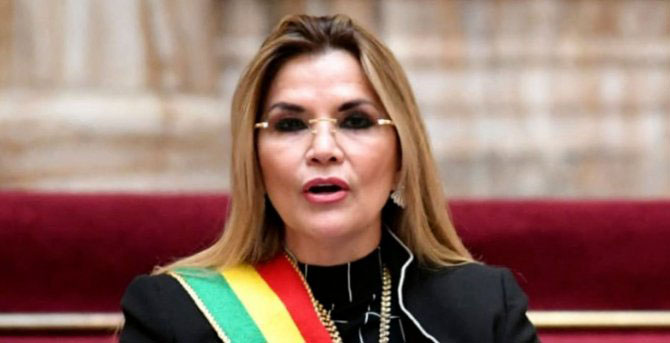LA PAZ, (Reuters) – Bolivia’s former interim President Jeanine Anez was behind bars yesterday in the capital of the country she led just six months ago after the new government arrested her on claims she participated in a 2019 coup to seize power.
Anez, who led Bolivia for less than a year after long-time former President Evo Morales left office following contested elections and violent protests, was arrested in a dawn raid on her home in the central city of Trinidad and transferred to La Paz by military plane.
According to an arrest warrant Anez posted on social media, she and a raft of ministers and security officials face charges of terrorism, sedition and conspiracy over an alleged coup against Morales.
The detained ex-president was pictured some hours later behind bars in a women’s’ holding cell in La Paz awaiting a judicial hearing that was to take place within 24 hours.
She and other opposition politicians have denounced her arrest as unconstitutional. She claims she is the victim of “aberrant political persecution.”
In letters to the Organization of American States and the European Union, Anez appealed for them to send observer missions to evaluate her arrest and those of several other ministers. “It is an absolute outrage, they are accusing us of being accomplices of an alleged coup,” Anez told local television as she arrived at a La Paz airport under heavy police escort. “There is not a grain of truth in the accusations, it is simple political intimidation. There was no coup. I took part in a constitutional succession.”
The move represents a steep escalation in hostilities between the current socialist administration of Morales’ political ally and successor President Luis Arce and more conservative political opponents it accuses of ousting Morales.
Anez took power in late 2019 after Morales resigned amid widespread violent protests against his government over allegations he stole an election when running for an unprecedented and unconstitutional fourth term.
At least 33 people were killed in violence that followed the election, 30 of them after Anez took office.
Morales’ Movement for Socialism party, now headed by President Arce, his former economy minister, swept back to power in a landslide election last October, prompting Morales to return from exile in Argentina.
Government Minister Eduardo del Castillo confirmed on Saturday that the Public Prosecutor’s Office had detained Anez for involvement in a “coup in our country.”
He also confirmed the arrest of Anez’s former justice and energy ministers, and insisted due process would be followed.
“There is no political persecution on our part here, and we do not fear anyone who thinks differently,” he told a news conference. “Our government is making sure justice exists in our country.”
The arrests drew condemnation from fellow opposition politicians and some human rights organizations.
Former Bolivian President Jorge Tuto Quiroga, a candidate in last year`s election, said Arce had put aside talk of “peace and reconciliation” and was settling scores on behalf of Morales.
Carlos Mesa, another former president and candidate in the 2019 election, tweeted that Anez`s arrest was “arbitrary, illegal and in violation of her human rights.”
Anez`s former interior minister Arturo Murillo, who was also named in the arrest warrant but is thought to have left Bolivia following Arce`s election, tweeted “We Are All Jeanine.”
“My solidarity with a woman, mother and friend who gave her all for Bolivia, including her freedom,” he wrote.
The Americas director of Human Rights Watch, Jose Miguel Vivanco, said the arrest warrants contained no evidence to support a claim of “terrorism.” “For that reason, they generate justifiable doubts about whether this is not a politically motivated process,” he added.
There has been no comment on the detentions from Bolivia’s neighbors in the region, nor the United States, the European Union or the OAS, which was the principal international organization that alleged fraud in the 2019 elections.
Morales and his supporters have long claimed he was forced out in a military-backed coup and have alleged involvement by foreign governments.
Morales tweeted his support for the arrests, saying there had to be justice for the people killed, injured and detained following the “coup.”
“The authors and accomplices of the dictatorship that looted the economy and attacked life and democracy in Bolivia must be investigated and punished,” he wrote.
Anez’s 11-month caretaker administration took Bolivia in a sharply different direction from Morales and had itself detained some members of Morales’ previous government.






